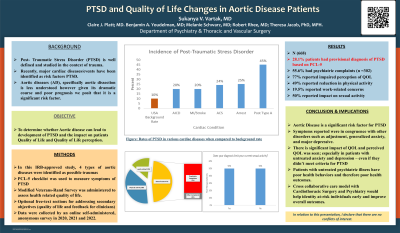Cardiology
Session: Poster Session
(007) PTSD and Quality of Life Changes in Patients with Aortic Disease

Trainee Involvement: Yes

Sukanya Vartak, MD (she/her/hers)
Fellow
Cleveland Clinic Foundation
Cleveland, Ohio, United States- CP
Claire Platt, n/a
Student
Maimonides Medical Center
NYC, New York, United States - MS
Melanie Schwarz, n/a
Attending
Maimonides Medical Center
Brooklyn, New York, United States - BY
Benjamin Youdelman, MD
Director of Thoracic Aortic Surgery
Maimonides Medical Center
Brooklyn, New York, United States
Presenting Author(s)
Co-Author(s)
Background: Acute aortic dissection is a catastrophic illness characterized by sudden-onset and critical timeline, high morbidity and mortality, and post-surgical quality of life changes. While recent studies have addressed the psychological consequences of various cardiovascular diseases, with prevalence rates of PTSD post-myocardial infarction, Stroke and TIA estimated as high as 23.2%, there is surprisingly little on aortic dissections in cardiac-psychiatric literature. Our study aims to determine whether there is a relationship between AD and PTSD and how it impacts quality of life (Qol). Results: Of the 434 respondents, 57.6% had a provisional diagnosis of PTSD based on PCL-5 scores >33. However, the incidence of PTSD varied significantly among them depending on the type of their AD (p = 0.04). Type A Aortic Dissection patients scored higher on the PCL-5 scale than those with other types of AD. Multivariate logistic regression analysis illustrate that AD is a significant risk factor for developing PTSD (p=0.01). Qualitative (n=302) shows that 77.5% of respondents have perceived QoL impairment of which 55.6% reported psychiatric complaints, 49% reported reduced physical activities, 19.5% reported work-related concerns, and 6.3% reported issues with sexual activity. Conclusion/Implications: Aortic disease is a significant risk factor for PTSD and other psychological disorders like adjustment disorder, depression, and anxiety. Qualitative data indicate that physical limitation and employment-related issues are of significant concern. Reference: Dollenberg, A., Moeller, S., Lücke, C. et al. Prevalence and influencing factors of chronic post-traumatic stress disorder in patients with myocardial infarction, transient ischemic attack (TIA) and stroke – an exploratory, descriptive study. BMC Psychiatry 21, 295 (2021). https://doi.org/10.1186/s12888-021-03303-1
Methods: In this IRB-approved project, four types of aortic conditions were identified as possible traumas: Type A Aortic Dissection, Type B Aortic Dissection, Aortic Aneurysm with Surgical Repair, and “Watch and Wait” Aortic Aneurysm. Symptoms of PTSD were measured using a modified PTSD Checklist for the DSM-5 (PCL-5). Additionally, quality of life measures and other qualitative data were gathered via free-text questions in the survey. This anonymous survey was distributed online via a patient support group email list for three consecutive years between 2020 -2023
Discussion: Treating PTSD can be extremely important as it is associated with poor health behaviors. QoL is significantly impacted by diagnosis of AD – increased psychological complaints, reduced physical activity, impact on work and sexual health. Therefore psychological screening, prevention measures, and support, should be considered to mitigate the effect of AD on mental health of cardiac patients.

